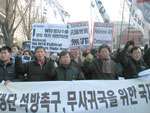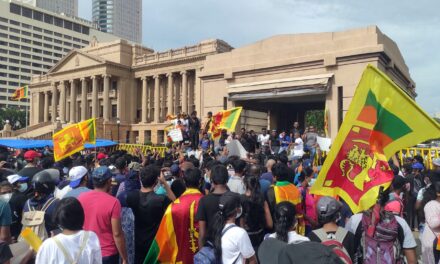December 6-7— The last day of the #EndWTO Bali Week of Action highlighted yet again peoples and citizens’ movements cry for justice and dignity and collective resolve to change the rules of the game from the ground up. The common view is that the World Trade Organization (WTO) has created more imbalance, injustice, and inequality than what it promised. This view was reinforced by the Global People’s Tribunal (see first story below). But at the same time, social movements and grassroots organizations from around the world, especially in Asia, are not only resisting old institutions, they are building new ones. They are breaking and writing new rules; constructing alternatives and creating better societies (see Stories of hope, resistance and alternatives).
Meanwhile, at the WTO Ministerial Meeting, ministers from developed and developed countries have traded the future and lives of the people they claim to serve. The “Casino of Death”, that is the WTO (see below), have yet again failed to protect people’s interests and food sovereignty. The Bali package, unfortunately, is a done deal. High rollers such as the transnational corporations and developed countries such as the US, EU, and Brazil are having a field day! They might have won the Bali battle but the people—the poor and the hungry, shall one day prevail. In the words of the great South African leader Nelson Mandela who recently passed away, “It seems impossible until it’s done”.
WTO: guilty of crimes against humanity and nature
On the morning of December 6, at the GOR Stadium, the esteemed panel of justices of the Global People’s Tribunal on WTO, Free Trade Agreements, Investments, & Transnational Corporations read their verdict:
The Indictment
A. We the Justices of the Global People’s Tribunal on WTO, Free Trade Agreements, Investments & Transnational Corporations, have heard the substantive testimonies of the affected communities and sectors, including women and children, peasants, fishers, workers, migrants and indigenous peoples in Indonesia, other Asian countries (India, Korea, Thailand, Cambodia), and other regions – Latin America, Canada.
B. These testimonies have given evidence on
– The systematic violation of human rights
– The massive destruction of livelihoods and the environment
– The privatization and commodification of the commons and of nature
– The violation of international law
C. These testimonies clearly show that the WTO and the global trading system, including FTAs and other related policies are part of the root causes of the violations and corporate crimes mentioned above. On the other hand, this system has generated maximum profits for corporations and elites and has failed to provide for peoples needs.
D. These testimonies have also clearly demonstrated that the global trade regime is a neoliberal system constructed by transnational companies and complicit governments to provide a legal architecture that enables corporations to act with impunity.
E. The WTO has consolidated an intellectual property regime that has further dispossessed communities and people through processes of the privatization and commodification of nature and life.
F. Corporations have organized themselves in corporate bodies to advance their interests and influence government policy making as in the case of corporate bodies in Japan, US and the EU who are involved in the design of the TRIPs and trade system attached to it.
G. The testimonies are a rich source of evidence not generally available in the public domain. These unique people’s reports and profiles of corporate crimes need to be shared widely to raise awareness and understanding of the injustices brought about by the WTO and the global trading system, and strengthen citizens and public involvement in the struggle to transform this system.
H. These testimonies are clear expressions of peoples’ and communities’ continuing search for justice as the crimes of the WTO and the global trading system, the corporations and complicit governments go unpunished. We decry the fact that access to justice for those who are affected by these crimes is not possible in the current judicial system of corporate impunity.
I. We underline people’s inalienable right to justice. We acknowledge the importance of social movements and civil society organisations engagement in the campaigns to end corporate impunity, the WTO and the trade & investment regime.
J. We recognize that the struggle of resistance goes hand in hand with the construction of alternatives of an economy for the people and the planet, with initiatives such as the indigenous knowledge systems, seed banks, food sovereignty, and a new paradigm for trade and investment, as well as a new juridical system that will deliver justice.
Panel of Justices
Elizabeth Mpofu (Chair), Zimbabwe; Lidy Nacpil (Member), Philippines; Nandini Gawadhia (Member), India; Brid Brennan (Member, Ireland; Henry Saragih (Member), Indonesia
Bali. Indonesia December 4th, 2013
Stories of hope, resistance and alternatives
Right after the reading of the indictment of the Global Peoples’ Tribunal, Serikat Petani Indonesia (SPI), KRUHA, La Via Campesina and Focus on the Global South organized a panel on Reclaiming Rights, Defending Nature: Peoples’ Forum on Alternatives to the Free Trade and Investment Regime, which gathered various social movements from farmers groups to women and youth, from workers to indigenous peoples. The speakers from the Philippines, Thailand, Taiwan, South Korea, Cambodia and Indonesia shared stories of political struggles for democratization, claim-staking, justice, and dignity. As a response to the growing dysfunctionality and dangers of the free trade and investment regime, small-scale food producers, workers, women, youth, indigenous peoples, civil society organisations, academics, elected officials, and local entrepreneurs all over the world have joined forces to protect their food systems, jobs, environments, communities and political processes. They have educated themselves and others, and are building multi-level, cross-sectoral and inter-generational resistances to the WTO, global capitalism, neoliberalism and corporate hegemony. Promoting and building alternatives to the dominant financial and economic systems are crucial elements of these growing resistances. People have realised that they cannot trust their governments to adequately address the crises the world is facing, nor can they wait for global institutions to change. They themselves must become directly involved in identifying and implementing solutions that are systemic, democratic, sustainable and just.
Here are concrete and actual alternatives and resistance struggles that are underway and happening in different parts of Asia:
“In the Philippines, small farmers from an agro-forestry area after winning their struggle for land, are now the suppliers of seeds and seedlings to the government. They were able to make the land productive, increased their income enabling them to provide food on the table, send their children to school, and roof over their heads; in the process transforming their own community for the better.”—Danilo Carranza, KATARUNGAN, a national farmers’ federation in the Philippines
“The Northern Peasant Federation is proposing Four Laws for the Poor to help protect our community land rights. The components of which includes the progressive land tax or a measure to tax the rich and those who own huge tracts of land, a land fund bill to be managed by the community, a national communal rights policy on resources intended to protect those people living in the forests, and a fund for justice for rights defenders and farmers being criminalized by the state.”- Mr. Sarawut, Northern Peasant Federation, Thailand
“We are educating self-help communities in their struggle against land grabbing; to keep the land in people’s hands.”- Mr. Liu Chi-Chang, Taiwan Farmers Union
“Women peasants in Korea are protecting native seeds through practice and local laws; and through the Sisters’ Garden Plot initiative, once a week, consumers directly get the produce of farmers who are engaged in agroecological production. This is how we practice food sovereignty.”- Ms. Kim Mikang, Korean Women Peasants’ Association
“We learned a lot from people-to-people exchange and visit, including our recent trip in the Philippines, to learn about land grabbing. Through these, we have managed to pressure our local government to pass a special scheme for us to manage our land in Sukabumi, West Java”.- Tan-tan, Serikat Petani, Indonesia
“The Forum Bali, which campaigns against the reclamation of Lake Benoa are building alliances across sectors and citizens of Bali, including musicians because they have a huge fan base. Our struggle is not only political but also cultural—we want to keep our way of life. If the governor of Bali succeeds in building a big mall and other buildings in the lake that would not only destroy Bali’s ecosystem but also will affect our livelihoods.”
“Jakarta citizens are taking back their water from the private sector, Suez, through a citizen’s law suit. We’re campaigning for the termination of the contract. It is necessary to transform the current “Water Development” hegemony into water democratization by channeling the ‘issue’ through political process; sensitize political institutions to the emergency of acknowledging water and sanitation as Human Right.”- Reza Muhammed Sahib, KRuHA people’s coalition for the right to water, Indonesia
“Democratization is at the heart of our struggle for alternatives. It is important to organize at the grassroots level, build a common platform across sectors and not speak on behalf of people. With people united, we can win anything”.- Sophear Chrek, United Sisterhood, Cambodia
The Casino of Death
Before the release of the WTO Director General’s text, Gerak Lawan, the Social Movement for an Alternative Asia (SMAA), and #EndWTO allies from around the world staged a performance outside the WTO plenary hall. Dubbed as the WTO: Casino of Death where the stakes are high and the costs even higher, the activists dramatized how the WTO gambles on people’s future. Each time the “high roller” represented by the European Union, United States, Brazil and transnational corporations rolls the “dice of death”, food, health, water, commons, sovereignty, democracy, jobs, and livelihoods are sacrificed. And what the dice represent is actually the “Bali Package”, which contrary to claims of the developed countries, contains only “death, tyranny, the burning of the planet, and injustice”.
The performance ended with the reading of the collective statement [hyperlink] led by La Via Campesina and Serikat Petani Indonesia leader, Henry Saragih, Institute for Global Justice’s executive director, Riza Dimanik, and World March of Women and Coalition against Trafficking of Women in Asia-Pacific head, Jean Enriquez.
For more photos of the action, visit http://www.flickr.com/photos/tni/sets/72157638405989644/
http://www.flickr.com/photos/8448347@N03/sets/72157638457865245/
Shame, shame on you!
The Bali Package was finally signed at the eleventh hour. While developed countries, the G33, and free trade proponents hail this as a victory, it is however a failure to deliver development. Gerak Lawan, the Social Movement for an Alternative Asia (SMAA), and #EndWTO allies issued a statement on why trade campaigners, social movements and peoples’ organizations are writing off the signed deal as bad for sustainable development, people’s food sovereignty and interests, and the planet.









